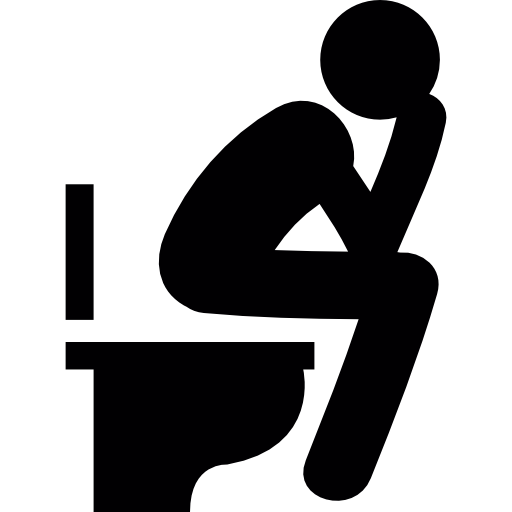No products in the cart.

Top 5 Dietary Strategies that can relieve you from Constipation
Constipation is a common digestive disorder that affects millions of people worldwide and reduces the quality of life. It is characterized by having less than three bowel movements a week, hard dry stools that are difficult to pass or feeling bloated and uncomfortable. Constipation can range from mild to severe and can cause significant discomfort and disruption in a person’s life. While medications and lifestyle changes are often used to treat constipation, right nutrition also plays an important role.
Symptoms:
The symptoms of constipation vary from person to person, but they all have in common a lack of bowel movement. Most common symptoms of constipation are :
- Pain during or after defecation
- Presence of hard dry stools
- Increased amount of straining during bowel movement
- Infrequent bowel movement
- Feeling bloated and uncomfortable
- Presence of blood in the stool
- Feeling tired after eating
Causes
Diet and lifestyle causes
Low fiber intake, inadequate water intake, eating large amounts of dairy products, lack of physical activity, stress , travel or similar routine changes, and resistance to the temptation to go to the toilet are some of the diet and lifestyle causes for constipation.
Medical conditions
Some medical conditions that lead to constipation are GI disorders like irritable bowel syndrome, diverticulitis, Neurological disorders include Parkinson’s disease, multiple sclerosis, stroke, spinal cord injury, Psychological problems like depression, anxiety,eating disorder, Anal conditions such as anal fissures, anal strictures and hemorrhoids, Myopathic disorders like amyloidosis and scleroderma.
Dietary modification strategies:
Here are 5 major food categories that one must include daily to combat constipation.
- Increase fiber intake
- Eating a diet high in fiber is one of the most effective ways to combat constipation.
- Fiber supports the healthy balance of bacteria in the digestive tract and also helps gut motility by bulking up stools and making them easier to pass.
- Good sources of fiber are whole grains such as millets, oats, quinoa, brown rice etc., legumes, pulses, fruits, vegetables and dried fruits.
- Drink plenty of water
- Drinking plenty of water is essential for maintaining a healthy digestive system.
- Not only does it help to keep hydrated, but it also helps the body absorb nutrients from food and can help to soften stool and make it easier to pass.
- If you are a healthy adult without any additional health complications, then aim to drink at least 8-10 glasses of water a day to keep the digestive system running smoothly.
- Include Probiotics
- Adding probiotic rich food to diet can improve digestion and reduce constipation.
- Probiotics are beneficial bacteria that help to keep the digestive system healthy and regulate bowels.
- Foods that are rich in probiotics include curd, buttermilk, sauerkraut, kefir, kimchi, tempeh and kombucha. Eating these foods can help to replenish the beneficial bacteria in the gut and can help to reduce constipation.
- Consider adding Prebiotics
- Prebiotics are non-digestible plant fibers that support the growth and activity of the beneficial bacteria, which can help to maintain a healthy balance of microorganisms in the gut.
- Prebiotics help to improve the consistency of stools and increase the frequency of bowel movements.
- Good sources of prebiotics are onion, garlic, chicory root, asparagus, banana, apple, oats, barley etc.
- Do not miss on Healthy fats
- Healthy fat sources such as cold pressed or filtered oils, ghee, avocados, nuts and seeds have shown to increase the strength of intestinal contraction and help to stimulate the movement of stool through the digestive tract.
Regular physical activity is also important for relieving constipation. Exercise helps to stimulate the digestive system and get things moving. Aim to get at least 30 minutes of exercise a day to keep the digestive system active.
Foods to avoid during constipation
There are certain foods that may contribute to constipation and should be avoided as these can worsen the situation:
- Processed & packaged foods – These foods are often high in additives and preservatives and may be low in fiber, which can contribute to constipation.
- Dairy products – In some individuals dairy products such as milk and cheese may contribute to constipation. This effect is most common in those who are sensitive to the protein found in milk.
- Refined foods – Foods such as breads, biscuits, instant noodles etc. contain less fiber than whole grains, which may cause constipation.
- Fried foods – Fried foods are low in fiber and high in fat and salt. These may contribute to slow digestion and increase risk of constipation.
- Alcohol – Alcohol can dehydrate the body when consumed in high amounts, which may increase the risk of constipation.
- Green tea & other herbal teas – Though green tea and herbal teas have many health benefits, consuming more than 1-2 cups per day can cause constipation as they are very strong and potent in their action, and can also act as diuretics.
It’s important to note that every individual has a different body type, and what may cause constipation in one person may not have the same effect on another. If a person is experiencing constipation, it may be helpful to keep a food diary to track the intake and identify any potential triggers.

Dietitian



